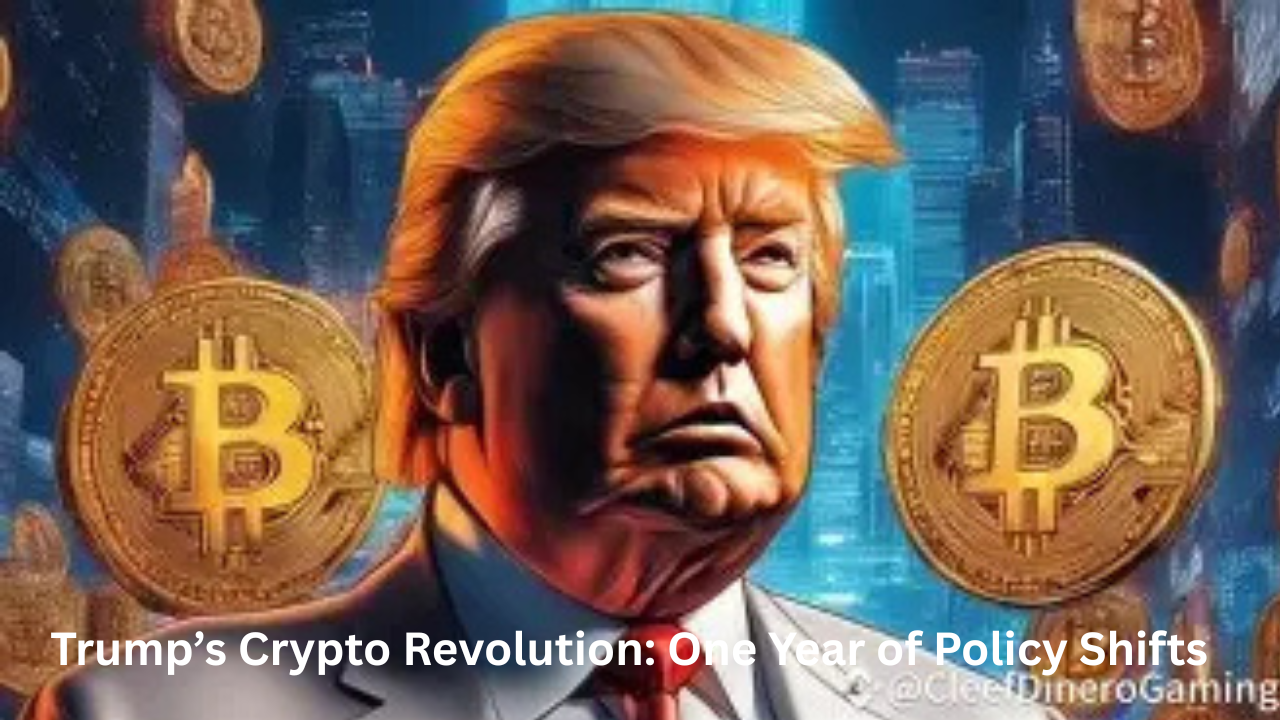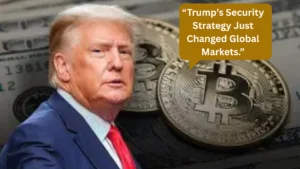D.C. — A year after Donald Trump’s unexpected return to the White House, the U.S. crypto industry is on a rollercoaster of rising hope, policy advances, and political turmoil.
Many people who invest in digital assets were happy when Trump won the president again in 2024. They thought his administration would support blockchain innovation. A year later, that hope has turned into significant policy gains, but not without some bumps in the road.
Trump's First Move in Crypto
President Trump made it plain from the start that digital assets would be a big part of his economic plan. He told agencies to look into how blockchain may improve government processes by making them more open and efficient through a series of executive orders.
One of the most talked-about ideas he had was to build up a national Bitcoin reserve to keep the government’s crypto assets as a long-term investment. The CEO of the Digital Chamber, Cody Carbone, praised the move and said, “From day one, Trump has made digital assets a priority and told government agencies to learn how blockchain can change how government works.”
From being a pariah to a top priority
Just two years ago, crypto companies were under a lot of attention because of fraud scandals and bankruptcy. But in 2025, the sector is a major political issue. The principles that guide and establish national innovation in the U.S. Stablecoins Act (GENIUS Act) was passed by Congress with Trump’s support. It is the first major government crypto law in U.S. history.
The rule was a big turning point. It was meant to keep people who make stablecoins in line and bring up new ideas.. It made the U.S. the world’s leader in digital currency policy. But it has taken a long time to put into action because the Treasury Department and banking agencies are still working on rules and getting public input.
The House has passed the Digital Asset Market Clarity Act, which is another important law. It is still stuck in the Senate, though. The lawmakers want it to make clear rules for trade sites, how to group tokens, and how to keep investors safe.
Pro-Crypto Appointments and Changes in Regulation
Business rules have also changed because of Trump’s choices. Paul Atkins is one of his most important choices. He has been a supporter of cryptocurrency for a long time and is currently the head of the Securities and Exchange Commission (SEC). Atkins has promised to get rid of the old “regulation-by-enforcement” method and replace it with regulations that are clear and good for innovation.
Jonathan Gould, a former blockchain lawyer, is now in charge of the Office of the Comptroller of the Currency (OCC). This shows that banks are continuing to move toward integrating digital assets.
Kristin Smith, president of the Solana Policy Institute, said it was a “complete reversal of federal crypto policy.” She also said that “America has gone from punishing innovation to competing to lead the global digital economy.”
Suggested News//Here’s what Elon Musk needs to do to get his $1trillion from Tesla.
Political Unrest Stopped Progress
Trump’s unstable way of governing has cost him, even though he has won these times. The U.S. government was shut down for the longest time ever. history has stopped important crypto projects, such the market structure bill that is now pending.
Most people blame Trump and Republican legislators for the deadlock, according to polls. The budget deadlock has taken attention away from crypto laws and put professionals who were supposed to be working on regulatory frameworks on leave.
Senate talks around the Digital Asset Market Clarity Act had already reached a breaking point before the shutdown. Some Republicans still don’t think the package is ready to move forward. Many lobbyists in the sector now think that the ultimate passage could be pushed out until 2027 because the midterm elections next year are likely to make it hard for both parties to work together.
Hold on to your projects
Trump’s big idea for a federal Bitcoin reserve is still just that: an idea. Before the reserve can become a reality, lawmakers may need to give their approval for extra financing or power. Also, proposed tax changes for digital assets are still on hold because Congress can’t agree on anything.
The shutdown has also stopped crypto companies from getting new licenses and certifications from groups like the SEC. These delays could slow down the energy that was building up at the start of Trump’s second term, which is bad for an industry that lives on momentum.
Questions of morality and political pushback
Crypto CEOs love Trump a lot, but some are worried about his personal stakes in digital assets. Reports say that some of the biggest holders of Trump’s own memecoin were invited to a private dinner with him, which raised worries about possible conflicts of interest.
A lot of those investors were from other countries, and the government wouldn’t give them a guest list. Democrats have jumped on the story and accused Trump of leveraging his position to help his own cryptocurrency holdings.
Trump’s picks for staff have also been questioned. He had to pull his first nominee for chair of the Commodity Futures Trading Commission (CFTC) since both parties were against it.
Cryptocurrency CEOs in the White House
Even though there have been problems, Trump’s ties to the crypto business have gotten stronger. A lot of big CEOs, such those from Coinbase, Ripple, Tether, and Gemini, have gone to White House events to celebrate the administration’s support for blockchain.
But this close partnership hasn’t kept Trump from losing political power. His acceptance ratings have dropped to 58% disapproval, mostly because younger voters who earlier backed his comeback have changed their minds.
Recent state elections reveal a big shift toward Democratic candidates, which is bad news for Republicans in the 2026 midterms. If Democrats win back the House, Trump’s plans for cryptocurrency could run into additional problems, which would mean more compromise between the two parties in the years to come.
A Year of Change
Even with the problems, it’s hard to argue that Trump’s first year back in office has changed the crypto world. Hiring, investment, and policy involvement in the industry have all gone up.
Summer Mersinger, CEO of the Blockchain Association and former U.S. commodities regulator, stated, “President Trump and a pro-crypto Congress have helped digital asset companies grow and hire more people.”
It’s not certain if Trump can keep this momentum going despite political problems. But after years of regulatory antagonism, the U.S. crypto business has found its strongest partner yet, even though that alliance has its ups and downs.








